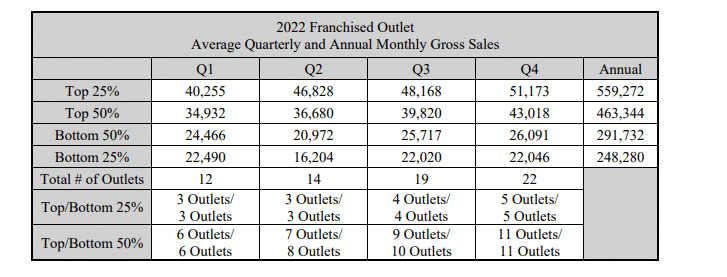ISI Elite Training Franchise FDD, Profits & Costs (2025)

ISI Elite Training is a dynamic player in the boutique fitness industry, recognized for its unique approach to group fitness that combines high-energy, coach-led workouts with a strong community atmosphere.
Founded in 2011 by Adam Rice in Myrtle Beach, South Carolina, ISI Elite Training quickly identified itself as a brand with significant potential for growth.
It expanded into franchising in 2019 and has since established dozens of locations across the United States. The franchise operates on a model designed to maximize client engagement and retention by focusing on high-intensity, athletic-based training (ABT).
Each session is structured to cater to a variety of fitness levels, ensuring that everyone from beginners to seasoned athletes can participate and benefit.
Initial Investment
How much does it cost to start a ISI Elite Training franchise? It costs on average between $327,000 – $687,000 to start a ISI Elite Training franchised center.
This includes costs for construction, equipment, initial inventory, and early operating expenses. The exact investment will vary based on factors like the facility size, location, and whether the franchisee opts to lease or purchase the property.
| Type of Expenditure | Amount |
|---|---|
| Initial Franchise Fee | $60,000 |
| A/V Equipment | $20,200 – $30,000 |
| Equipment, Furniture and Fixtures | $55,700 – $81,000 |
| Real Estate | $6,800 – $20,500 |
| Real Estate & Construction Management | $15,000 |
| Leasehold Improvements (with no Tenant Improvement allowance) | $68,500 – $256,500 |
| Utilities | $1,000 – $3,000 |
| Signage and Graphics | $13,000 – $22,500 |
| Startup Inventory and Uniforms | $2,200 – $4,000 |
| Grand Opening Marketing | $5,000 – $20,000 |
| Optional “Done-For-You” Presales Program | $0 – $55,000 |
| Facility Personnel Compensation: Pre-Opening | $15,000 – $30,000 |
| Insurance | $2,750 – $4,500 |
| Travel, Lodging and Meals for Initial Training Program | $0 – $3,000 |
| Training Fee | $3,000 |
| Technology Fee (From signing Franchise Agreement through third month of operation) | $6,750 – $9,000 |
| Business Licenses, Permits, Certifications, Soft Construction Costs, and other Professional Fees | $12,500 – $20,000 |
| Additional Funds (3 months) | $40,000 – $50,000 |
| Total Estimated Initial Investment | $327,000 – $687,000 |
Average Revenue (AUV)
How much revenue can you make with a ISI Elite Training franchise? A ISI Elite Training franchised studio makes on average $429,000 in revenue (AUV) per year.
Here is the extract from the Franchise Disclosure Document:

This compares to $401,000 yearly revenue for similar fitness studio franchises.
Below are a few competitors as a comparison:

Download the Franchise Disclosure Document
Frequently Asked Questions
How many ISI Elite Training locations are there?
As of the latest available data, ISI Elite Training operates approximately 3 locations across the United States. These include facilities in Folsom, California; Simpsonville, South Carolina; and Aynor, South Carolina.
What is the total investment required to open a ISI Elite Training franchise?
The total investment required to open a ISI Elite Training franchise ranges from $327,000 to $687,000.
What are the ongoing fees for a ISI Elite Training franchise?
ISI Elite Training franchisees pay a 7% royalty fee on gross revenues, beginning at business launch or upon initial revenue. Additionally, they contribute 2% of gross revenues to the Brand Marketing Fund, which may increase to 3%.
Franchisees must also spend at least $4,000 per quarter on local advertising, with the initial quarter prorated for grand opening promotions.
What are the financial requirements to become a ISI Elite Training franchisee?
To qualify as an ISI Elite Training franchisee, you need a minimum net worth of $300,000 and at least $200,000 in liquid capital. Additionally, a credit score of 680 or higher is required.
How much can a ISI Elite Training franchise owner expect to earn?
The average gross sales for a ISI Elite Training franchise are approximately $0.43 million per location. Assuming a 15% operating profit margin, $0.43 million yearly revenue can result in $65,000 EBITDA annually.
Who owns ISI Elite Training?
ISI Elite Training is owned by its founder and CEO, Adam Rice. The ownership structure includes both company-owned and franchise-owned locations, with franchisees operating under agreements that grant them the rights to use the ISI Elite Training brand and business model.
Disclaimer
Disclaimer: This content has been made for informational and educational purposes only. We do not make any representation or warranties with respect to the accuracy, applicability, fitness, or completeness of the information presented in the article. You should not construe any such information or other material as legal, tax, investment, financial, or other professional advice. Nothing contained in this article constitutes a solicitation, recommendation, endorsement, advertisement, or offer to buy or sell any franchises, securities, or other financial instruments in this or in any other jurisdiction in which such solicitation or offer would be unlawful under the franchise and/or securities laws of such jurisdiction.
All content in this article is information of a general nature and does not address the detailed circumstances of any particular individual or entity. Nothing in the article constitutes professional and/or financial and/or legal advice, nor does any information in the article constitute a comprehensive or complete statement of the matters discussed or the law relating thereto. You alone assume the sole responsibility of evaluating the merits and risks associated with the use of any information or other content in this article before making any decisions based on such information or other content.




